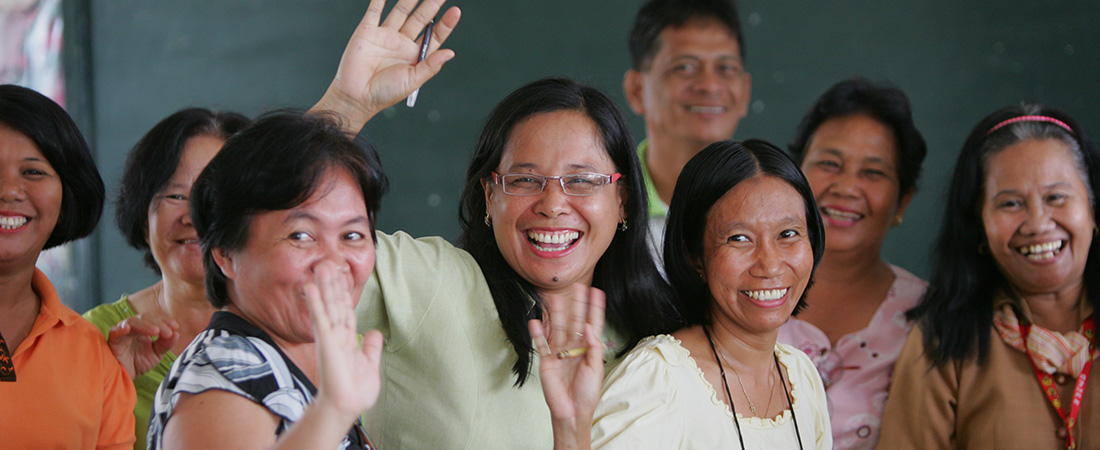Literacy Goal: 1 Million

Teachers in the Philippines participate in a literacy training.
Read Right Now! (website)
There is a critical transition that happens during elementary school—children first learn to read, then they read to learn.
Young students in the Philippines are struggling to do both.
“Many students cannot read with comprehension,” says EDC’s Marcial Salvatierra. “This is a problem that affects them throughout their academic careers.”
It’s an issue that concerns the Philippines Department of Education (DepEd), too. With funding from the U.S. Agency for International Development (USAID), EDC is now working with DepED to improve literacy instruction for 1 million primary grade students.
Yes, 1 million.
Called Basa Pilipinas—or “Read Philippines”—the project will help up to 9,000 first-, second-, and third-grade educators learn how to employ better instructional techniques in their classrooms. To help achieve this goal, EDC is leading a series of three-day professional development workshops in regions selected by DepEd.
The main approaches for Basa Pilipinas are based on Read Right Now!, a global reading initiative developed by EDC. Read Right Now! helps school systems deliver effective, large-scale literacy instruction, and can be tailored to the needs of individual countries. The program has already been rolled out successfully in Rwanda and Mali.
A new approach
EDC’s Yvette Tan believes that many Filipino teachers are struggling to teach early grade reading well because pre-service teacher preparation programs do not adequately address literacy.
“Most pre-service programs do not have a course about how to teach reading,” says Tan. “So most teachers teach reading the same way they learned how to read. And in many cases, they were taught through memorization and constant drilling.”
Moving away from this mode of instruction is important if students’ literacy and comprehension skills are to improve. EDC’s Nancy Clark-Chiarelli, a literacy expert and senior technical consultant on the project, believes that teachers need to approach reading instruction at a much more individualistic level than they have in the past, differentiating instruction for beginning readers.
“The interactions between a teacher and a child are critical to helping him or her become a good reader,” she says. “You have to get the right book in the right child’s hands at the right time.”
It might be a challenge to get teachers to leave old habits behind, but Tan and Clark-Chiarelli are going to try. At a series of Basa Pilipinas workshops held this summer, teachers learned new strategies for reading instruction, such as asking learners different kinds of text-based questions to strengthen comprehension skills. Teachers also spent time enhancing lesson plans and developing appropriate print reading materials to use in their classrooms.
However, the support doesn’t end when the workshops conclude. Once the teachers return to school, trained supervisors conduct classroom observations and offer follow-up support. And through its private sector partners, Basa Pilipinas is providing critically needed books and instructional materials.
“We’re trying to harness the strengths that exist and understand where the gaps are,” says Clark-Chiarelli. “The glass is definitely half full.”
Changing the system
Literacy instruction is not the only subject of reform in the Philippines. Under the current system, students finish school after grade 10, but graduates often have few options since they are still too young to enter the formal job market. DepEd is in the process of adding mandatory kindergarten, 11th, and 12th grades to the Philippines academic cycle, an effort that will be completed by 2016.
DepEd has also instituted a new “mother tongue” policy that requires schools to offer content in students’ native languages through third grade. Based on research that shows students learn to read better when they learn to read in their mother tongue first, the policy is an attempt to improve learning by ensuring that foundation subjects, such as reading, writing and arithmetic, are taught in the language students speak at home.
In practice, however, the policy has placed even more work on the shoulders of elementary educators who must now develop lesson plans and instructional materials in multiple languages. Implementation is especially complicated in some regions of the country where basic print materials, such as dictionaries and reading primers, simply do not exist.
But the Basa Pilipinas team remains confident that the Read Right Now! framework for teacher professional development, coupled with better access to materials, is the best way to improve the reading skills of children throughout the country.
“We can’t expect that teachers will entirely change their practice after a three-day training,” says Tan. “So it’s about giving them the means—both the know-how and the materials—to apply in practical ways what they’ve learned.”
